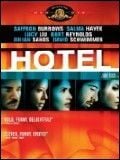Hotel, a 2001 British-Italian comedy horror-thriller film co-written and directed by Mike Figgis, is a cinematic experience that defies conventional expectations. The movie stars Salma Hayek, Rhys Ifans, and David Thewlis, among others, and unfolds in the shadowy corridors of a Venice hotel where the bizarre intersects with the macabre. At its core, it’s an unconventional narrative about a sex worker, a hired killer, and a film crew whose paths cross in unexpected ways, leading to a series of shocking revelations.
The Plot: A Freewheeling Blend of Genres
This freewheeling film blends elements of black comedy, horror, and thriller genres into a single package. Set against the atmospheric backdrop of a Venetian hotel, Hotel explores themes of desire, violence, and human frailty. As characters navigate their interconnected fates, the story delves into dark humor and unsettling twists. While some viewers may find the plot disjointed or baffling, others appreciate its bold refusal to conform to traditional storytelling structures.
A Homage to Iconic Cinema
For cinephiles, Hotel invites comparisons to Stanley Kubrick's landmark film, 2001: A Space Odyssey. In particular, the neo-classical hotel room from the penultimate scene of Kubrick's masterpiece serves as both inspiration and contrast. After astronaut Dave Bowman travels through the mysterious monolith, he finds himself in an enigmatic environment resembling a luxurious hotel suite—a space designed not to harm him but to challenge his perception of reality. Similarly, Hotel uses its setting to blur boundaries between illusion and truth, creating an atmosphere rich with symbolism and ambiguity.
Critical Reception and Audience Reactions
Upon its release, Hotel polarized critics and audiences alike. Some praised its audacious approach to genre blending and its willingness to subvert expectations, while others dismissed it as chaotic or unsatisfying. Reviews often highlighted the film's unique visual style, with cinematography that captures the haunting beauty of Venice, as well as its performances, particularly those of Hayek and Ifans. However, many agreed that the narrative structure could be perplexing for casual viewers who prefer straightforward plots.
Behind the Scenes: Making Movies in Unusual Spaces
Hotel also reflects on the process of filmmaking itself, incorporating scenes where a production crew attempts to shoot a guerrilla-style adaptation of The Duchess of Malfi within the confines of the titular hotel. This meta-narrative adds another layer of complexity to the story, inviting audiences to consider the relationship between art and reality. Interestingly, parts of the actual filming took place in cramped hotel rooms, mirroring the challenges faced by independent filmmakers working under tight budgets and limited resources.
Cultural Impact and Legacy
Despite its mixed reception, Hotel remains a fascinating case study in experimental cinema. Its influence can be seen in later films that embrace non-linear storytelling and surreal aesthetics. Moreover, the film's exploration of existential questions—such as identity, mortality, and connection—resonates deeply with modern audiences seeking thought-provoking entertainment. For fans of avant-garde cinema, Hotel stands out as a daring experiment worth revisiting.
Conclusion: Is It Worth Watching?
Ultimately, whether you'll enjoy Hotel depends on your tolerance for unconventional narratives and ambiguous endings. If you're looking for a straightforward Hollywood blockbuster, this might not be the film for you. But if you're open to exploring the darker corners of human nature through a lens of artistic experimentation, then Hotel offers plenty to ponder. With its striking visuals, memorable performances, and provocative themes, it carves out a distinct place in the world of independent cinema.
In conclusion, Hotel isn't just a movie—it's an experience. Like the iconic hotel room from 2001: A Space Odyssey, it challenges viewers to look beyond surface-level interpretations and embrace the unknown. And perhaps that's the most compelling reason to give it a chance.

